Archive Entries for May 2021
« April 2021 | Main | June 2021 »
Monday May 31, 2021
Books in May
- The Summer Before the War by Helen Simonson [read by Lucy Scott]
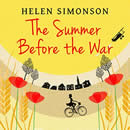
I was reminded of Major Pettigrew (and his Last Stand) and fell to wondering what the author had written since - this book is the answer to the question. I read a number of slightly critical reviews but I was very smitten with it. Set in Rye, it's impossible not to link it with the Mapp and Lucia books, and indeed the author intentionally references them, with more than a nod, in both in the manner in which she writes as well as more overtly in some names and general characteristics. Although although it shows all the charm and satirical humour of small town life, it is also quite dark. Things do "work out" for the main characters in the story but not without great cost. The injustices and deep hurts caused by the small mindedness of the (essentially rural) pre-war society are eventually overcome - mainly because a lot of the more minor class-ridden thinking is swept away in the aftermath of WW1, or pales into insignificance in comparison with the huge losses experienced by all classes of the society.
But we begin in 1914 - it is the end of England's brief Edwardian summer, and everyone agrees that the weather has never been so beautiful... - GreenMantle by John Buchan [read by Christian Rodska]
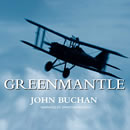
I needed a new book to listen to before falling asleep and thought Hannay would be a good Marple substitute - despite the full-on adventurous subject matter. I really like Christian Rodska so searched for books he has narrated - and found this one. After watching or hearing many adaptations of The Thirty Nine Steps, I did actually read it when I was in my 20s and discovered it to be interesting in that it was definitely an obviously of-the-era totally bloke's book - no love interest - in fact no female's at all really. This is the second Hannay adventure, and cut from the same cloth - except instead of being on the run in Scotland, he is on the run with a "gang", across Germany and into Turkey, spying against the Germans.
The adventures as they traveled were episodic, and it was jolly exciting and full of derring do. However, it may be because of the late night listening, but overall it did not seem to have a very coherent plot. And don't ask me about the Green Mantle... The "book blurb" clarifies the plot for me more than reading the individual parts: Richard Hannay sets off an a hair-raising journey through German-occupied Europe to meet his old friend, Sandy Arbuthnot in Constantinople. [Note that they both set off from London but for some reason go by different routes]. They struggle to subvert German espionage attempts in the Middle East and halt the further spread of pro-German sympathy in the Muslim world. Hannay spends much of the time pretending to be a pro-German version of his South African self - and Rodska delivers a entire panoply of suitable accents for the characters, as he is wont to do. Patriotic fervour at its best (or possibly worst depending on your viewpoint).
Like The Thirty Nine Steps there are no women to speak of ("Women had never come much my way, and I knew about as much of their ways as I knew about the Chinese language") barring The One... and I feel I have to reproduce this section of the book (philosophy thrown in for free) as I found it so extraordinary:
"It's true all the same. Women have got a perilous logic which we never have, and some of the best of them don't see the joke of life like the ordinary man. They can be far greater than men, for they can go straight to the heart of things. There never was a man so near the divine as Joan of Arc. But I think, too, they can be more entirely damnable than anything that ever was breeched, for they don't stop still now and then and laugh at themselves ... There is no Superman.
...
But there is a Superwoman, and her name's Hilda von Einem."
There is such a lot of weirdness in this book that I'd love to write even more but in fact this is a great review from a Simon Guerrier in 2009 which I could not possibly top. He rather nails the key aspect by saying: "Hannay himself is a problematic hero for modern readers". [He does seem to say throughout that the American character is called Blenkinsop when I believe he is the rather more unusually named Blenkiron]. - The Long Call by Ann Cleeves [read by Ben Aldridge]
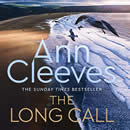
Ann introduces us to a new set of characters here; they are maybe trying a bit to hard to represent a modern slice of the middle classes with excessive "inclusivity" all round, but the individuals were really well portrayed and likeable. I am glad to have a younger set of police characters leading an investigation, (rather than, say, an elderly birdwatching couple of amateur sleuths). Also the setting is North Devon - around Barnstaple - which has happy (if sketchy) farm holiday memories for me through a family connection to farmers in the area.
Had this been a stand-alone novel I would have been more fearful of the outcome for the characters - Ann's stories have a tendency to be poignantly sad - but I saw this described as a "Two Rivers Mystery - Book 1" (nothing like planning ahead - The Heron's Cry is due to be published in September 2021) which comforted me a little as the story progressed. I am hopeful that the author has at least her "three book deal", and I see that filming of a TV series is already underway, with 4 episodes, which might give a good chance for a faithful dramatisation of the book. - Dead Tomorrow, Dead Like You, and Dead Man's Grip
by Peter James [read by David Bauckham and Jamie Glover]So now I have moved on through the next 3 books, I'm afraid I remain exasperated at the writing style.
Plots: tick; tension: tick; pace: tick.
Repetition and unnecessary detail: big tick...You do not have to take a character, describe his every item of clothing, and compare his looks to that of a well-known actor, in order to paint a good picture of the person in a reader's mind's eye. I am no writer, so I looked for what techniques my other favourite authors use, and find that just one or two key (acutely observed) points are sufficient to reveal the personality type on the page. Likewise, you do not have to describe every room you enter as if you were making an inventory for a house clearance auction. Whilst it is evocative and fun to use a picturesque city as a backdrop for a story - and it is interesting for me to read about roads and places I know well - it is not necessary to have a journey described with every single turn in the road as if the writer were reading and A to Z of the city. On this issue of repetition, he also has a problem when referring back to events (or people and places) in previous books; I think this can be hard for an author to achieve as ideally you don't want to reveal other plots and spoil things for people reading out of sequence. However, not only is this aspect not well executed, but descriptions (of people and places) are repeated from previous books, word for word, almost as if he's used cut-and-paste. Again, referring to other authors, I find they are very clever at finding new ways to sketch a character who might be well-known to some readers, but new to others.
While these books are by no means unreadable or without interest, I feel that this writing style is lazy with the author believing quite the reverse due to his (clearly) enormous efforts at his so-called "research". I am surprised at James, as he seems to be an experienced career writer, and I just expected something better.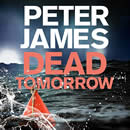
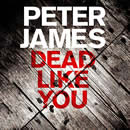
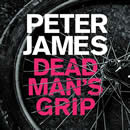
-
Island of the Mad by Laurie R King
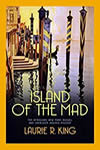
I like the way this author (fairly obviously) visits a wonderful exotic location, does her research, and bases the location of her book there. It reminds me of Mary Stewart who (fairly obviously) worked in much the same way. Given that this author's books are set in a previous era I guess it's slightly harder to ensure period accuracy - but then I would be happy to go along with it either way, not knowing any better. In this case it's Venice that provides the marvelously glamorous setting. As a bonus we also meet Cole Porter, who becomes a key player among the smart set with whom Russell and Holmes are involved; this is an example of another point I enjoy about King's stories. Although they have their roots in an extremely English icon of literature, she introduces wholly appropriate American links, whether through people or place, and does so seamlessly, which I think takes more skill than might be apparent.
As a complete contrast, the book also explores - as the title implies - institutions housing those deemed to be insane, both in Venice, and in England (Bedlam - which, by 1925, had evolved from its Victorian reputation - as something of a prison or freak show - into more of a sanctuary for those afflicted).
In this story, Russell is again asked to track down a missing person in the shape of the aunt of an old friend from Oxford, Lady Vivian Beaconsfield, who has spent most of her adult life in and out of one asylum or another, and who has disappeared following a supervised outing from Bethlem Royal Hospital. The trail leads to Venice and Holmes "tags along" with his own mission from Mycroft to review the rising tide of fascism in Italy. -
The Trouble with Goats and Sheep by Joanna Cannon
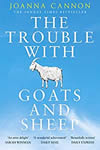
This is also set in a hot English summer, and the protagonists are two 10 year old girls, who decide to solve the mystery of why one of their neighbours has suddenly gone missing for no apparent good reason - o, and because God is "everywhere", to find him as well. It has slight shades of The Curious Incident of the Dog in the Night; we see the world through the girls' eyes and the adults' reactions to them, which provides perhaps slightly more humour and slightly less pathos. However, again, this is a story with a dark side. Everyone in the street has secrets, but the one thing they are all sure about is "that bloke at number 11 is a weird pervert and needs to be driven out"...
The 1976 time period was very evocative for me - it's rather like the "what were you doing when Kennedy was assassinated?" cliche. For me, that whole summer was: living in Wimbledon, the heat, my cat, my University finals, and and my first job in a stifling new office block (where we were not allowed to open windows despite the "teething trouble" with the air conditioning).
Posted on May 31, 2021 at 9:40 AM. Category: Books of the Month. | Comments (0)
